
by Maryanne W. Waweru | Oct 29, 2015 | 2015, Advice, Africa, Culture, Kenya, Traditions, World Motherhood
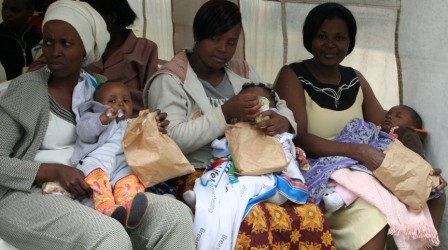
Last Sunday, my closest friend became a mother for the first time. It has been excitement galore from all the people who know her: her family, her friends, her colleagues, neighbors, acquaintances, and just about everybody.
When I visited her in hospital, I found myself giving her all kinds of advice about motherhood from breastfeeding, to weaning, to walking, to teething, all that and more.
Then I quickly told her that I would add her to some Facebook groups that would be of great help to her as a new mum. I began by adding her to a group that is exclusive to Kenyan mums who are breastfeeding. As I did so, I amused myself at how Kenyan mums have turned Facebook into their go-to resource center.
There are plenty of Facebook groups by and for Kenyan mums whose membership constitutes a certain phase of the motherhood journey.
For example, when one is trying to conceive, there is a group to join. When she conceives, she then swiftly moves on to a group for pregnant mums. Once she has her baby, she moves on to the next group –that of breastfeeding mums. After that its a group dedicated to weaning, and where nutrition advice is offered –by fellow mums.
Then there are also larger groups made up of Kenyan mums with babies of whatever age, a general group where everything about motherhood is discussed. From schools, to detergents, to diapers, to cooking fat, tissue paper, to the very critical issue of house girls (nannies). Everything goes. Each of these groups have thousands of members, with one even having slightly over 90,000 members!
I have been in all of these groups, and I am still members in some of them.
In the traditional African setting of the past, new mums were guided into the motherhood journey by the older women around them: their mothers, their aunts, their grandmothers, older cousins and female neighbors.
However, in today’s society some of these traditional fabrics are slowly ebbing away.
More women have to work to supplement the family income, which leaves little option for staying at home to look after the children. In fact, we are seeing less and less of the special interactions between generations of women when it comes to raising her child.
Consequently, we are turning to our friends, our online friends, most of them strangers, for advice that would otherwise have been given to us by our ‘African mothers.’ Combine that with modern technology where access to the internet in many African urban cities is growing, and accessing information and connecting with mums online becomes inevitable.
Sometimes when I think about it, I believe it’s unfortunate, especially for those of us who live in the urban towns, that we no longer have easy access to those traditional pieces of motherhood advice that we would have received directly from our mothers. But, in turn, we are grateful about how the internet has made our parenting journeys significantly easier for our modern lifestyles. Because, it truly has. But, it is only natural to wonder if we may be missing out on something lost.
How has online motherhood support played into your experience as a mother?
This is an original post to World Moms Blog by contributor Maryanne W. Waweru of Kenya.
Photo credit of Kenyan women to the author.
Quote image credit to World Moms Blog.
Maryanne W. Waweru, a mother of two boys, writes for a living. She lives in Nairobi, Kenya with her family. Maryanne, a Christian who is passionate about telling stories, hopes blogging will be a good way for her to engage in her foremost passion as she spreads the message of hope and faith through her own experiences and those of other women, children, mums and dads. She can be found at Mummy Tales.
More Posts - Website

by Aisha Yesufu | Oct 8, 2015 | 2015, Africa, Inspirational, Nigeria
World Mom, Aisha Yesufu in Nigeria, has an incredible amount of drive. From humble beginnings, she worked hard at her education and it became her family’s ticket to a better life. We’ve had the chance to join her virtually on World Moms Blog’s panel at the World Bank on the right to a universal education in April, and she is truly, an inspiration.
Just in time for International Day of the Girl on Sunday, get ready, women and girls everywhere, to reach your goals and make things happen!…
If you want to reach your goals, start a business, or start doing anything else for that matter, it has to start in your mind. You have to believe in yourself. You have to believe that you can do it, and this is where most times we have a problem. We start something without actually believing that we can do it. Sometimes we just start certain things without truly believing in ourselves.
We are either pressured into doing it, or doing it because others are doing it; and its expected of us. We start never truly believing in ourselves. You just go ahead to start something, and even you, yourself, are not sure you can do it. You don’t believe you can do it and along the way things begin to fall apart and you begin to blame external forces.
There are no external forces affecting us. The problem is our mindset. What is your mindset when you are about to start? That is something that we can change.
Other times we never start something because in our minds we do not think we are worthy of it or capable of it.
You have to realise your mind does not know the difference between reality and what is not real. Let me give an example. You are just sitting down having a nice time and all of a sudden you hear bad news. You know what happens when we hear bad news? Everything changes, and we begin to cry or scream or feel sad. Your whole body, your whole mind, everything changes. What happened? It’s only that the news got to you!
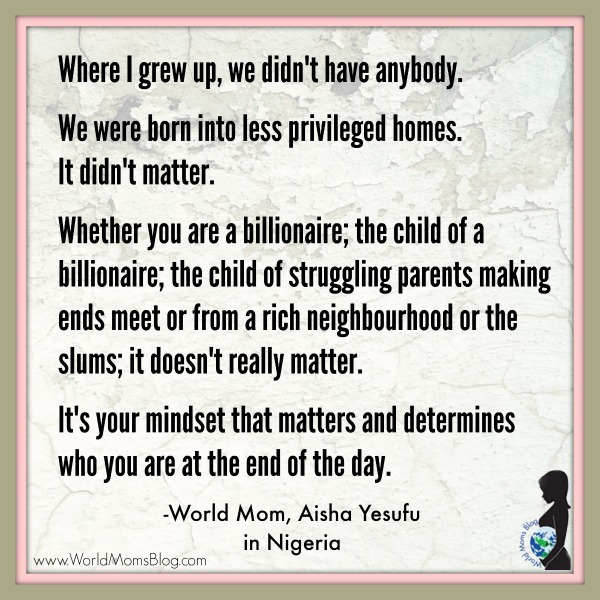
You don’t even know if what you just learned is true or not. Have you confirmed the bad news? Fact checked it yet? No! You just heard the news and that’s it. That’s the mind. It does not ask for confirmation whether the news is true or not, it goes into the mode it’s fed. That means your mind does not know the difference between truth and a lie. It is reactionary.
If you have continously been told you would amount to nothing all your life and you feed your mind that same notion, well, then, guess what? You may think this is true about yourself! You have to free yourself from the shackles of mental bondage.
You can always trick your mind. For example, you can tell your mind you are the greatest business person in the world. In fact you are at par with Dangote, a billionaire and businessman in my home country of Nigeria. Your mind doesn’t know whether it’s the truth, or not. It’s going to accept it, but the thing you need to do now is to begin to do what smart business people do. I listened to Dangote once on a live interview on TV sometime in 2001 or 2002, and he said he goes to work around 9am and doesn’t close before 9pm.
For me that was a wake up call. I had one of my “Aha!” moments then. When I first saw him I thought, “If only God will bless me the way he has blessed this man.” And when I heard he works 12 hours a day, for me, that was a wake up call.
If you trick your mind into thinking that you are among the ranks of the leaders, and you begin to work as they do, you may begin to set bigger goals for yourself. You can run with the best of them, but you have to BELIEVE it.
When you are trying something new with the mindset of negativity, it could impede your progress. At that point, you may not want to even bother starting. It failed before it took off because it failed in your mind, if you did not have the right mindset. But I believe this thinking can be changed.
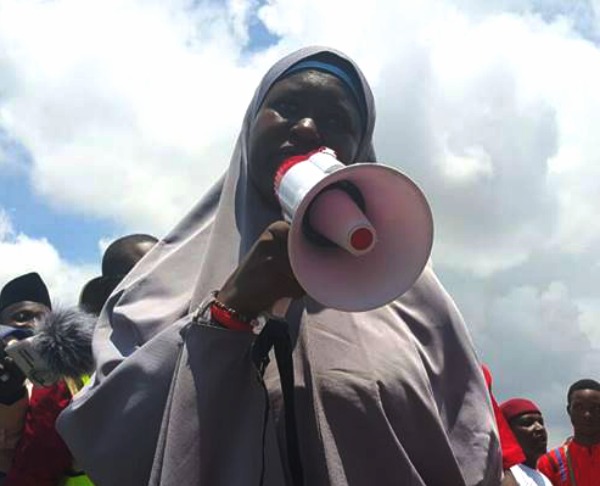
World Mom, Aisha Yesufu, speaks out in Abuja on August 17, 2015 against anti-corruption in Nigeria.
Business and goal setting starts in your mind and you need a lot of patience. Business needs patience, patience and more patience. There is nothing like overnight success.
It’s a whole lot of hard work starting something new and having the right mindset. Persevering, focusing on what you are doing. Setting goals and moving on. This does not come easy, but I believe if you keep going that is what leads to that “overnight ” success that a lot of people see. Our mindset is very important and often times when you talk to people the mindset is just not positive. We are looking at our past and looking at who we were and not who we could be.
Where I grew up, we didn’t have anybody. We were born into less privileged homes. It didn’t matter. Whether you are a billionaire; the child of a billionaire; the child of struggling parents making ends meet or from a rich neighbourhood or the slums; it doesn’t really matter. It’s your mindset that matters and determines who you are at the end of the day.
If you don’t believe you are a star you can never be a star. If you don’t believe you are a success you can never be a success.
You can never be greater than your mind.
You have to set your mind higher. Give it goals. Give it targets. Give your mind something to work on. Trick yourself into thinking positively. It doesn’t know the difference between truth and a lie. Tell your mind a good lie. “You are a big time business person.” “You are a billionaire.” “You are on Forbes list.” Let your unconscious mind even when you are sleeping work on that.

Our mindset is of such utmost importance and most often we neglect it. We don’t work on it. There is a need for us to work on our mindset to project ourself mentally where we want to be before we begin to work on that.
Some use Affirmation like repeating to yourself…
I AM THE GREATEST BUSINESS PERSON. I AM THE GREATEST TEACHER. I AM THE GREATEST ASTRONAUT. I AM THE GREATEST CHEF. I AM THE GREATEST POLITICAL LEADER. I AM THE GREATEST MUSICIAN. I AM THE GREATEST FRIEND. I AM THE GREATEST PEACEKEEPER. I AM THE GREATEST HUMANITARIAN.
You can keep saying that repeatedly so it becomes engraved in your mind. Whatever you want to be, you need to let your mind know.
Once you have a positive mindset and believe you CAN, you can start thinking about setting goals to achieve something in your heart. Something that you would ordinarily look at as impossible, but because of your mindset you don’t see the impossibility. You see the POSSIBILITY. You just strike out the ‘im’ and you move on.
Have a positive mindset. Believe you can do it. Why not you? Why can’t you achieve it? If people are achieving it why not you? The difference between the achiever and the non achiever is the MINDSET. Go get ’em, World Moms!
This is an original post to World Moms Blog by contributor Aisha Yesufu in Nigeria.
Photo credit of Aisha to the author. Images to World Moms Blog.

by Elizabeth Atalay | Oct 6, 2015 | 2015, Cultural Differences, Culture, Education, Food, Ghana, Global Citizenship, Global Goals, Humanitarian, Kids, ONE, Social Good, Sustainable Development Goals, UN, United Nations, World Moms Blog
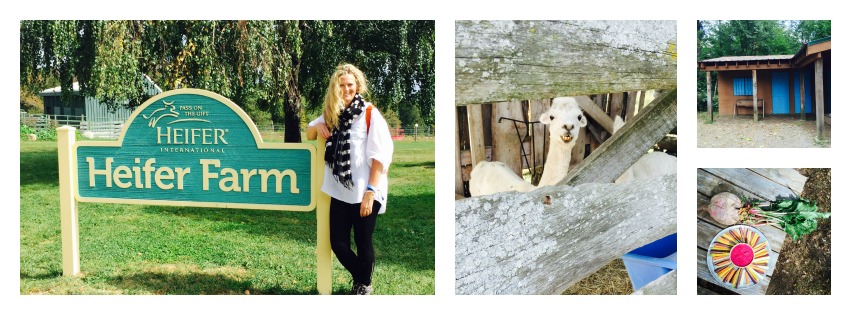
One day I was in New York City at the United Nations among World Leaders, and the next in rural Massachusetts milking a goat. Though the two may seem totally unrelated, they are actually intertwined. It will take both the efforts of world leaders and small share farm holders for the newly adopted Sustainable Development Goals to ever succeed. As a social good writer I had been to New York City for UN General Assembly week and the Social Good Summit, and then to Heifer International’s Farm located in rural Rutland, Massachusetts, where World Moms Blog had been invited to their first ever Media Day.
The new set of Global Goals are focused on sustainability which is one of the cornerstones of Heifer International’s approach. Heifer International was founded by Dan West based on his experience as a relief worker. He realized the aid work he was doing needed a new model to help those in need become self-sufficient as opposed to continually reliant on aid. As a farmer he knew that a gift of livestock was a gift that would keep on giving. A heifer refers to a pregnant cow, and in 1944 the first dairy cattle were shipped, and Heifer International born.
“Heifer International is a non-profit, humanitarian organization dedicated to ending hunger and poverty and caring for the earth. Heifer currently provides livestock, trees, seeds and training in environmentally sound agriculture to families in 30 countries, including the United States. We work with smallholder farming families and communities because we believe they are key to feeding us all.”- Heifer International
The goal of Heifer International is to help communities transform themselves through education, environmental stewardship, empowerment of women in the community, and the legacy of passing on generations of animals and knowledge. This in turn generates the accomplishment of the once recipient turning into a donor in their community.
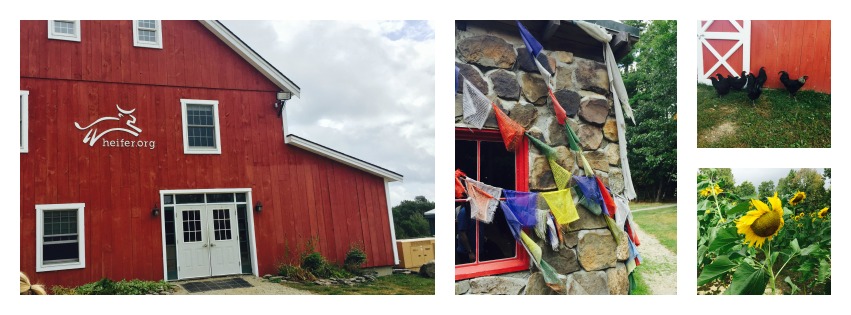
At World Moms Blog we have written about Heifer International in the past, included Heifer International in gift guides, and followed their trip last summer to Malawi with our friends at ONE Girls and Women. We had no idea however that Heifer International had a farm to showcase their programs this close to home. As it turns out, just over an hour from where I live is this hidden gem of global education!
At Heifer Farm in Rutland Massachusetts we toured the flourishing ¾ acre farm garden where we were encouraged to pull vegetables out of the ground and taste as we went along. A delicious fresh beet hummus, with a rainbow of carrot colors I had no idea they grew in, was served. Apparently the massive size of the vegetables grown at Heifer Farm has to do with the rich soil quality based on the farming techniques used, the same techniques taught to small share farmers working with Heifer International around the world. After the garden tour we had lunch in Peru.
Peru is one of the eight global villages at Heifer Farm that provide experiential, hands on learning through programs ranging from day trips to week-long camps for all ages. We then meandered through China and Ghana on our way to the barn. This brings us back to milking the goat, and to the tiny baby piglets we got to hold, and all I could think was how crazy my kids would have been for everything. I can not wait to bring them back to experience Heifer Farm! Other Heifer International sites in the US include Heifer Ranch in Perryville, and Heifer Village in Little Rock, Arkansas. If you ever have the chance to visit, I highly recommend it. If you do be sure to bring the kids, after all they are the future generation who will be seeing these new Sustainable Development Goals through to 2030. Global Goals that all stakeholders will need to be involved in, large and small.
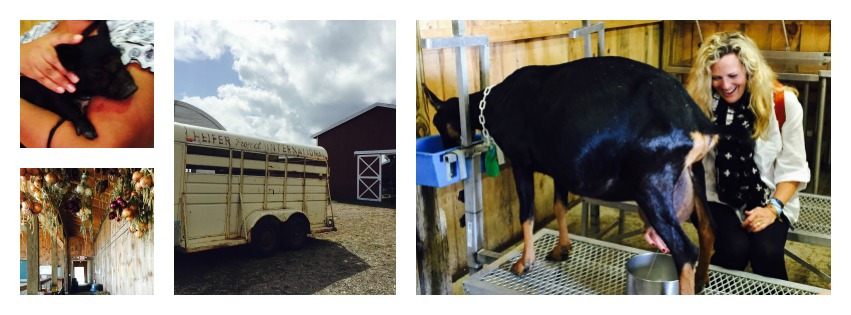
This is an original post written for World Moms Blog by Elizabeth Atalay who also writes at documama.org.

Elizabeth Atalay is a Digital Media Producer, Managing Editor at World Moms Network, and a Social Media Manager. She was a 2015 United Nations Foundation Social Good Fellow, and traveled to Ethiopia as an International Reporting Project New Media Fellow to report on newborn health in 2014. On her personal blog, Documama.org, she uses digital media as a new medium for her background as a documentarian. After having worked on Feature Films and Television series for FOX, NBC, MGM, Columbia Pictures, Warner Brothers, 20th Century Fox, and Castle Rock Pictures, she studied documentary filmmaking and anthropology earning a Masters degree in Media Studies from The New School in New York. Since becoming a Digital Media Producer she has worked on social media campaigns for non-profits such as Save The Children, WaterAid, ONE.org, UNICEF, United Nations Foundation, Edesia, World Pulse, American Heart Association, and The Gates Foundation. Her writing has also been featured on ONE.org, Johnson & Johnson’s BabyCenter.com, EnoughProject.org, GaviAlliance.org, and Worldmomsnetwork.com. Elizabeth has traveled to 70 countries around the world, most recently to Haiti with Artisan Business Network to visit artisans in partnership with Macy’s Heart of Haiti line, which provides sustainable income to Haitian artisans. Elizabeth lives in New England with her husband and four children.
More Posts

by Dee Harlow (Laos) | Sep 16, 2015 | 2015, Death and Dying, Lesotho, World Moms Blog
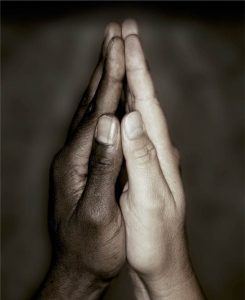
The Basotho and me
In death we bond
The Basotho and me
On a glorious morning
I heard your scream
When the death bell tolled
The pain in your cries
As I rubbed your back
Connected us
Me a cultural stranger
You huddled in your tearful sorrow
A young life departed
A friend is gone
A colleague forever missed
A brother lost
A husband mourned
If I’ve seen him once
They’ve seen him a thousand
Still we mourned together
The Basotho and me
A fate granted so unexpectedly
I’m a cultural stranger to sorrow
The West easily detached
They suffer sorrow all too often
Enmasse they gather together
In hundreds or more
Through the wake in solidarity
I followed in footstep
I hugged and held hands
Offering what I can
Not much from where I stand
The hymns in unison
Lifted heavy spirits high
Tributes and sermons in foreign Sesotho
So genuine and heartfelt
Struck universal cords of grief
At the end of processions
The longest for me
A friend said
“You’re one of us now.”
We are all humanity
The Basotho and me
This is an original poem written for World Moms Blog by our mother of twins, Dee Harlow, currently living in Lesotho. You can also find her on her blog Wanderlustress.
One of Dee’s earliest memories was flying on a trans-Pacific flight from her birthplace in Bangkok, Thailand, to the United States when she was six years old. Ever since then, it has always felt natural for her to criss-cross the globe. So after growing up in the northeast of the US, her life, her work and her curiosity have taken her to over 32 countries. And it was in the 30th country while serving in the Peace Corps in Uzbekistan that she met her husband. Together they embarked on a career in international humanitarian aid working in refugee camps in Darfur, Sudan, and the tsunami torn coast of Aceh, Indonesia.
Dee is now a full-time mother of three-year old twins and continues to criss-cross the globe every two years with her husband who is in the US Foreign Service. They currently live in Vientiane, Laos, and are loving it! You can read about their adventures at Wanderlustress.
More Posts
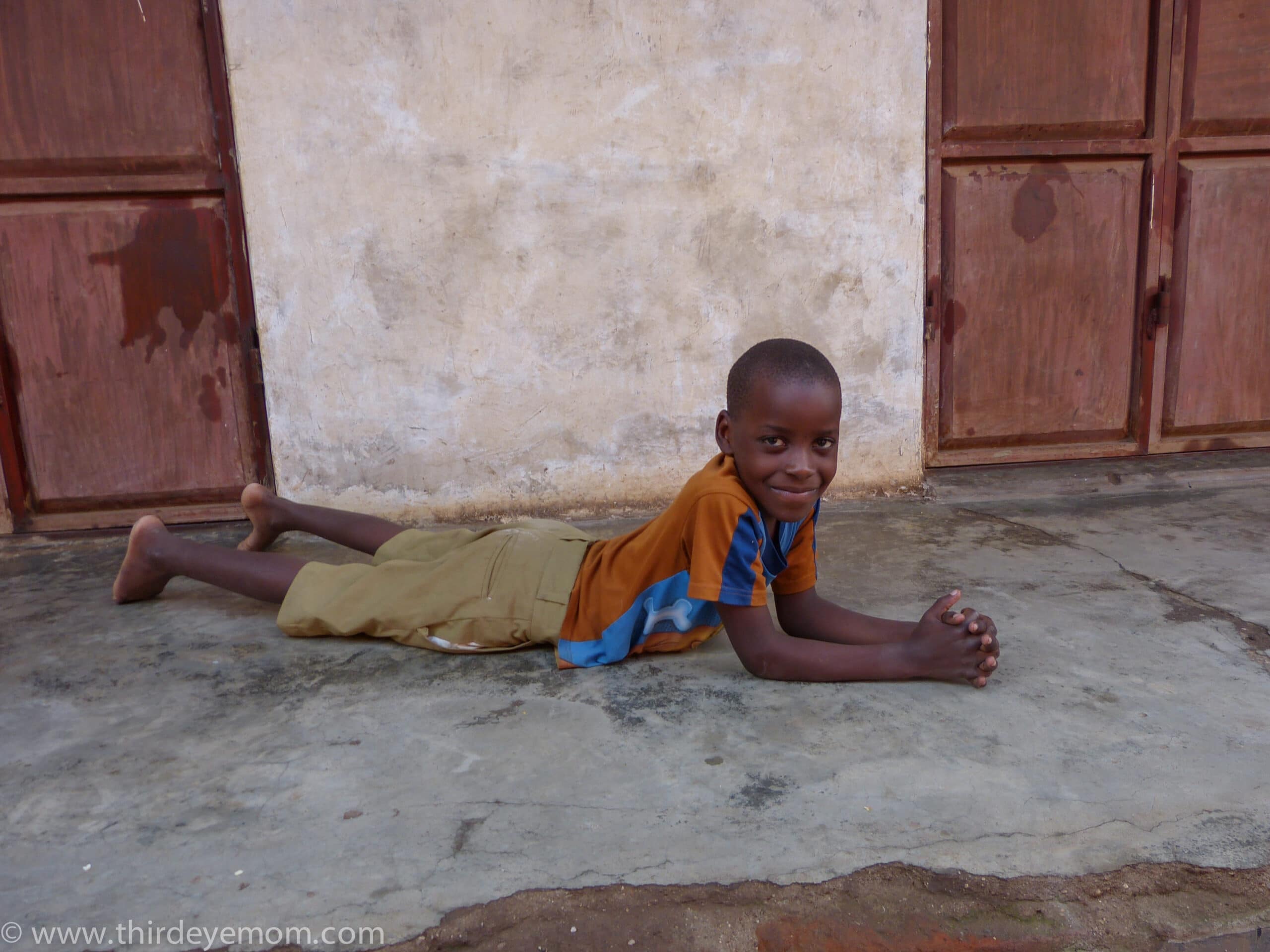
by Nicole Melancon (USA) | Aug 11, 2015 | 2015, Social Good, Tanzania, Third Eye Mom, World Moms Blog, World Voice
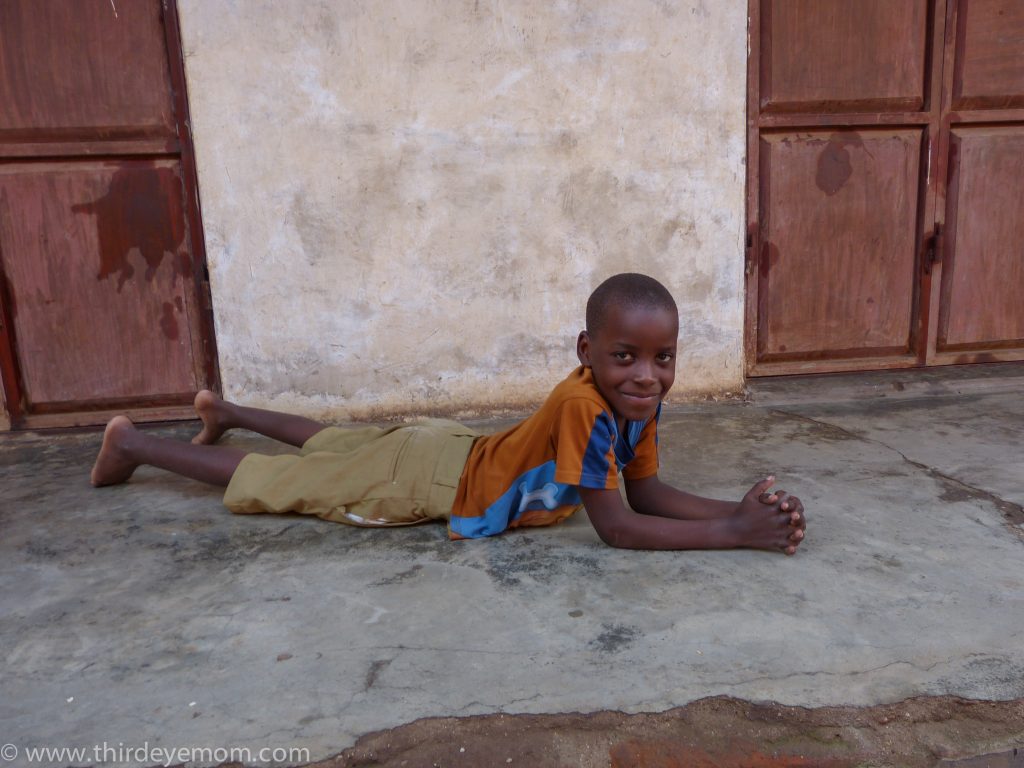
One of the boys smiles for the camera.
Traveling the world, I am always touched by the children of every place I go. Joy, creativity, and the desire to be loved is universal, and transcends borders, cultures, languages, and even circumstances in life. Despite some of the utter hardships some children face – whether it be war, poverty, hunger or disease – I find that kids are still kids no matter what. They all love to play, to learn, to have attention and love, and of course to smile.
Visiting children at either a local school, community-lead program or orphanage has become something I try to do on every trip to the developing world. I have found that even a short time spent playing and interacting with children, even if we can’t speak the same language, does wonders for the soul. There are tons of places in need of volunteers and visitors however finding the right place to visit can be tricky. Thankfully the perfect place to visit was just a short walk away from the gates of the hotel in Moshi, Tanzania where I was staying on my latest adventure.
The Springlands Hotel is the base of Zara Tours, one of the leading trekking and safari outfitters in Moshi and is the company we employed for our climb to Mount Kilimanjaro. Run by Zainab Ansell, Zara Tours has been brining guests on amazing adventures for over two decades and has also given back to the community in which they serve through the Zara Tanzania Charity. Zara Charity works to develop and support vulnerable groups within their community such as porters, Maasai women, and local orphans improving the lives for many.
Tanzania had been ravaged by the HIV/AIDS epidemic that swept across the African continent killing an estimated 30 million people from AIDS-related causes since its beginning twenty years ago (UNAID 2010 report). In Tanzania alone, HIV/AIDS has devastated an entire generation leaving a nation of orphans. UNICEF estimates that there are over 3.1 million children in Tanzania living without parents of which an estimated 1.3 million are orphaned due to HIV/AIDS. For many of these children, an orphanage is the only place they have to find food, shelter, education and medical attention.
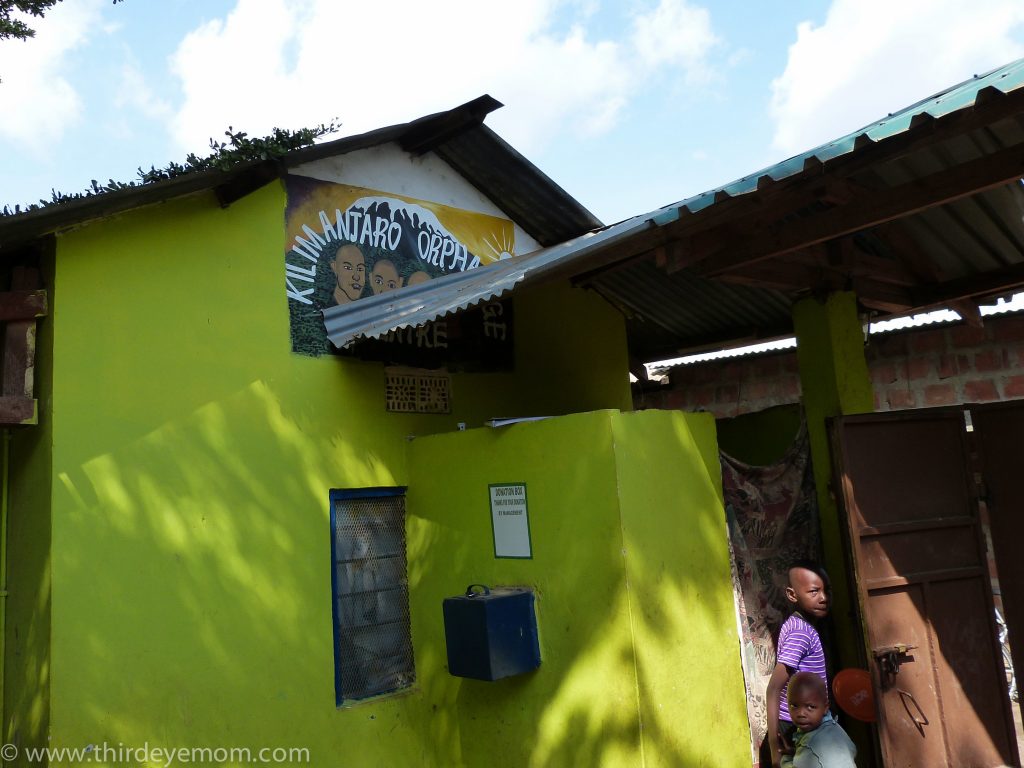
The Kilimanjaro Orphanage Center in Moshi, Tanzania
The city of Moshi was not spared in the HIV/AIDS epidemic. Right behind the Springlands Hotel lies the small community of Pasua, a dirt-lined street of homes and small businesses. In 2009, Edward “Teacher” Lazaro, a native Tanzanian, founded The Kilimanjaro Orphanage Centre in response to the dire need to provide care and shelter to an increasing population of orphaned children in the Kilimanjaro region. Lazaro collaborated with Zainab Ansell of Zara Charity to set up the orphanage and today the center cares for 60 resident orphans with the help of many dedicated local and international volunteers.
After a short five-minute walk, twisting and turning down the serpentine dirt streets of the village, I arrived at the gates of the Kilimanjaro Orphanage Centre. I could hear the laughter of the children from outside the gates. A large group of 20 volunteers were already inside playing frisbee with the children. This group would spend the next several days visiting the kids before doing a Kilimanjaro climb in honor of their charity.
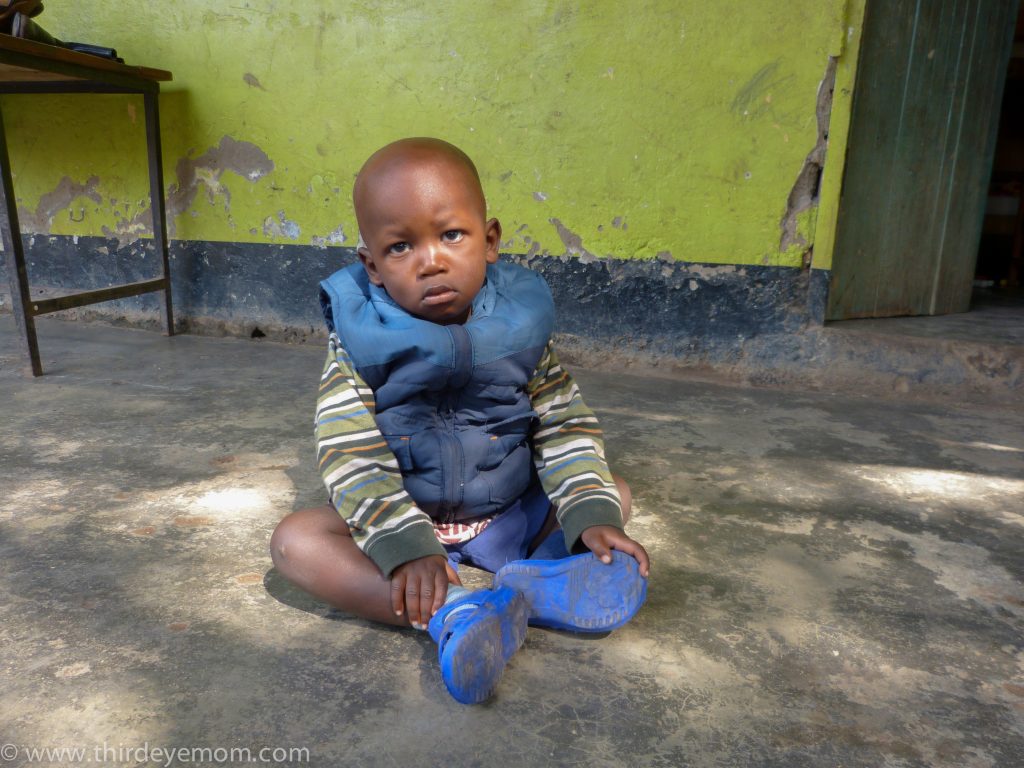
This little boy was a tough customer to get to smile. I found out he is a neighbor’s child who enjoys coming to play with the kids at the centre.
To learn more about the Kilimanjaro Orphanage Center and how you can help, click here.
This post was written by Nicole Melancon of ThirdEyeMom and edited for publication on World Moms Blog.
When you travel is there one particular thing that draws you in each place you go?
All photos by Nicole Melancon.

Third Eye Mom is a stay-at-home mom living in Minneapolis, Minnesota with her two children Max (6) and Sophia (4). Her children keep her continually busy and she is constantly amazed by the imagination, energy and joy of life that they possess! A world wanderer at heart, she has also been fortunate to have visited over 30 countries by either traveling, working, studying or volunteering and she continues to keep on the traveling path.
A graduate of French and International Relations from the University of Wisconsin Madison, where she met her husband Paul, she has always been a Midwest gal living in Minnesota, Wisconsin and Chicago. This adventurous mom loves to be outside doing anything athletic (hiking, running, biking, skiing, snowshoeing or simply enjoying nature), to travel and volunteer abroad, to write, and to spend time with her beloved family and friends.
Her latest venture involves her dream to raise enough money on her own to build and open a brand-new school in rural Nepal, and to teach her children to live compassionately, open-minded lives that understand different cultures and the importance of giving back to those in need. Third Eye Mom believes strongly in the value of making a difference in the world, no matter how small it may be. If there is a will, there is a way, and that anything is possible (as long as you set your heart and mind to it!).
Visit her on her blog, Thirdeyemom, where she writes about her travels and experiences in other lands!
More Posts
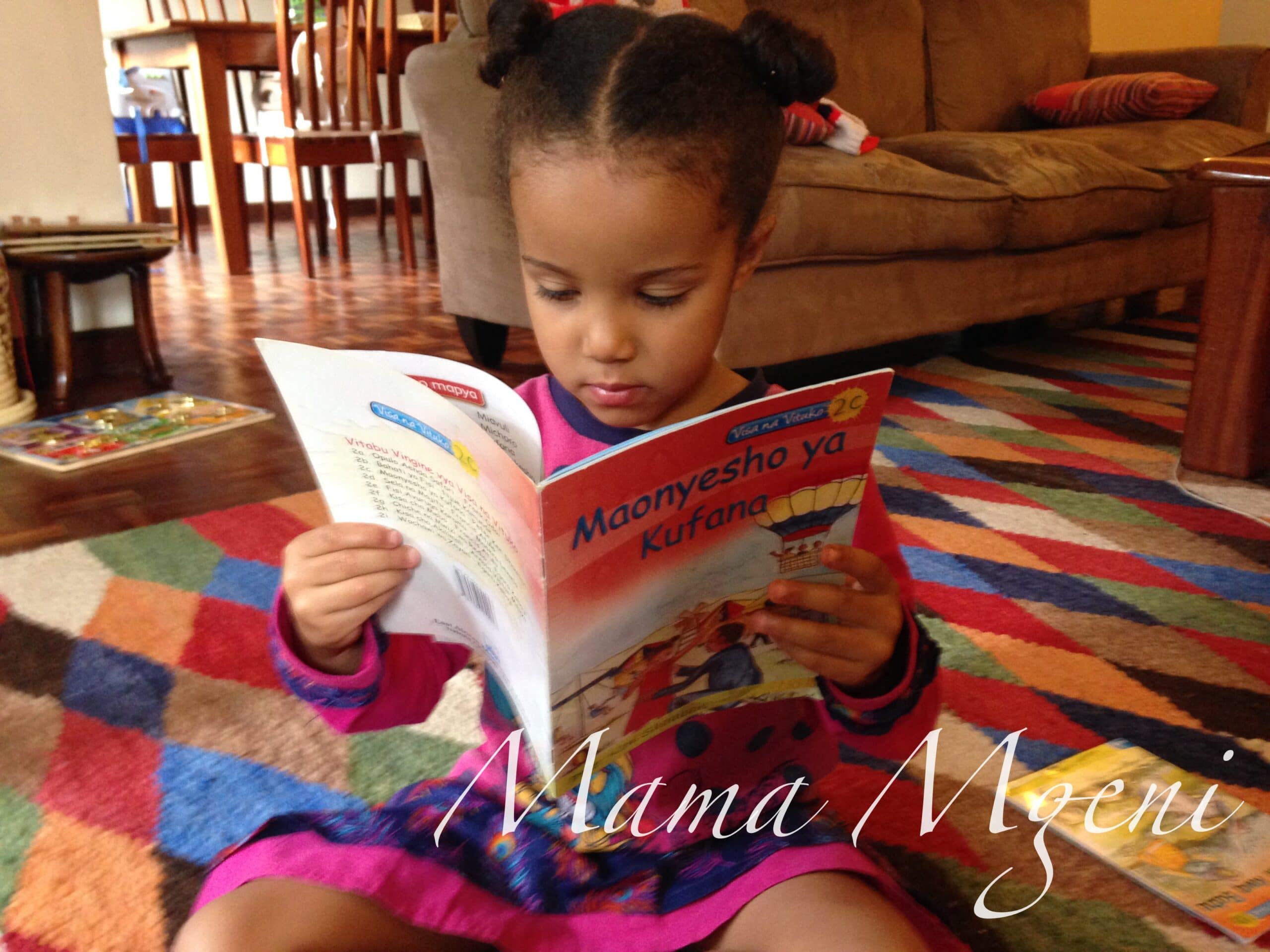
by Tara Wambugu | Jul 21, 2015 | 2015, Africa, Bilingual, Kenya, Language, Tara Wambugu, World Moms Blog, World Motherhood, Younger Children
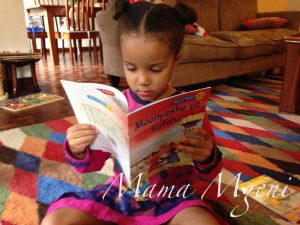
Learning Swahili
I have every reason in the world to learn Swahili. It’s one of the mother tongues of my husband’s (though Kikuyu is his real mother tongue, as he will tell you). It’s one of the official languages of the country, I call home. And a few years ago, a new compelling reason came along: our first-born child. We’re raising both of our kids to be bilingual, following the OPOL (One Parent One Language) approach.
I speak to the kids in English, while my husband speaks to them in Swahili. Our youngest daughter is just starting to use her first words – a smattering from both languages. Our eldest daughter is now 4 years old, and while she favors English when speaking, she understands nearly everything that she hears in Swahili.
It was difficult at first for my husband to speak Swahili with our newborn daughter. It didn’t feel natural to him, since our shared language has always been English. He had to constantly remind himself, and would often stop mid-sentence to repeat what he had said in Swahili. He told me that he didn’t want to say things to the kids that I couldn’t understand. But having my husband speak to our children in Swahili was probably the best thing for my own budding ability.
I have found that by listening to my husband speak simple Swahili to the children, I have begun to learn the language the way native-speaking children learn it: starting with the basics, slowly building with grammar and vocabulary. I may not be able to contribute to a political discussion around the dinner table with the extended family, but learning the language with my children has certainly increased my understanding of what’s being said around me, on the whole.
Listening to my husband read Swahili bedtime stories aloud to the kids has also helped my own language skills.
I find that random lines from the stories will start to swirl around in my head, subconsciously. There is something useful in listening to the same strings of words over and over, committing them to memory, even if by accident.
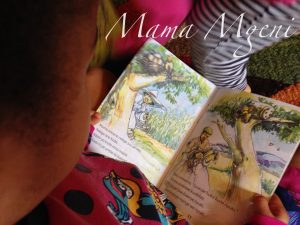
Learning Swahili
While nearly everyone we meet in Nairobi speaks English, learning Swahili with my kids has definitely helped me to communicate better with the people in our community that we see every day. Simple words like where (wapi), how many (ngapi), up (juu), and down (chini) actually come in quite handy when speaking to the staff at the greengrocer or to the attendant in a crowded parking lot. Furthermore, people are delighted when they see that I’m making an effort, and even more delighted when they see the children speaking in the local language.
It is so important to us that our children grow up speaking and understanding both of our mother tongues. And if I’m able to improve my rusty Swahili skills along the way, all the better!
Are your kids growing up in a multilingual household? Have you ever learned a new language with your children?
This is an original post to World Moms Blog by Tara Wambugu, our new contributor from Kenya.
Tara Wambugu is a wife, a mother of two, and a Kenya-based lifestyle blogger covering parenting, family life, travel, and more. A former aid worker, Tara has worked in various countries in Europe, Central Asia, Africa, and Central America. She is now a stay-at-home mom living in Nairobi with her husband and their two sassy little girls. You can follow Tara and her family’s adventures on her blog, Mama Mgeni.
More Posts - Website
Follow Me:

































